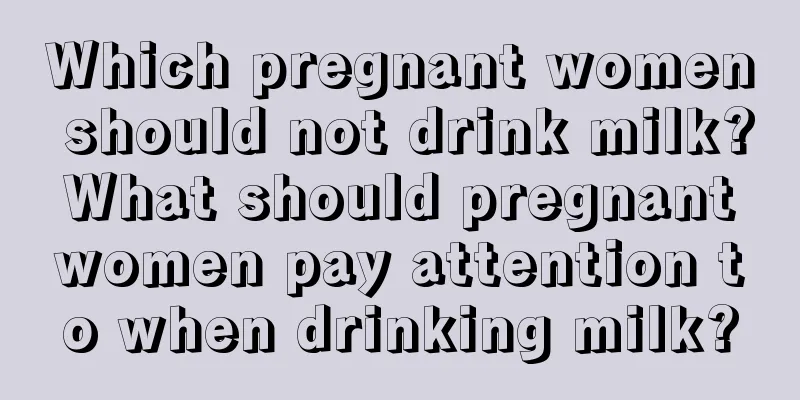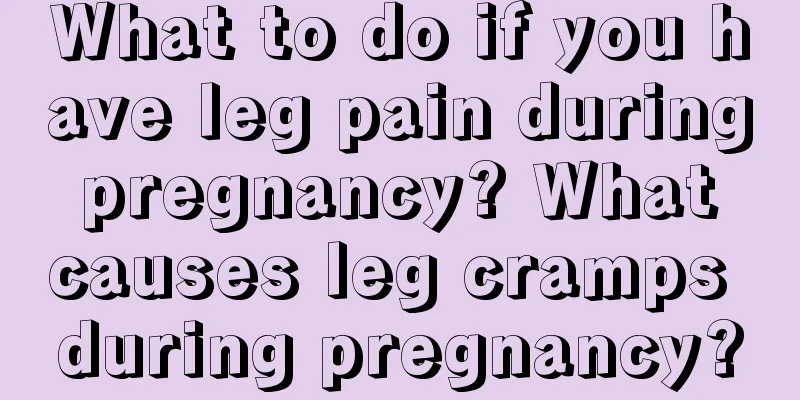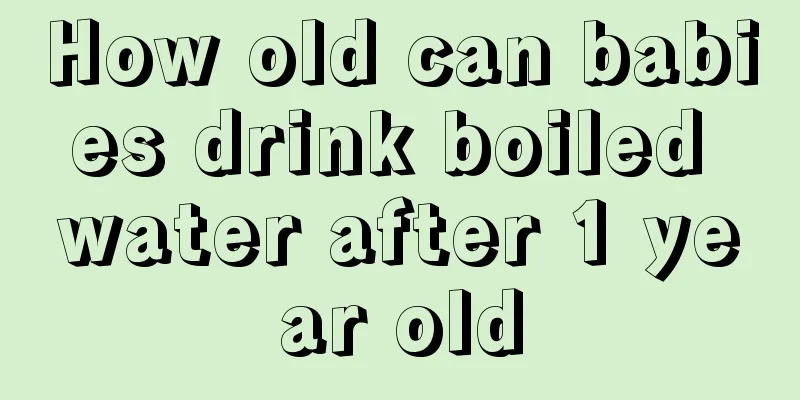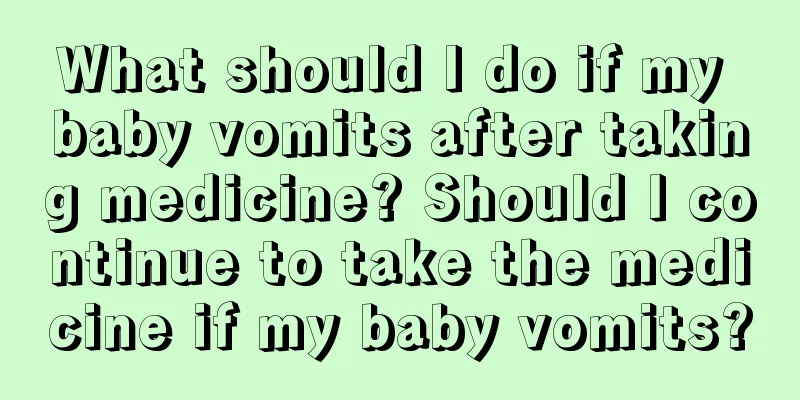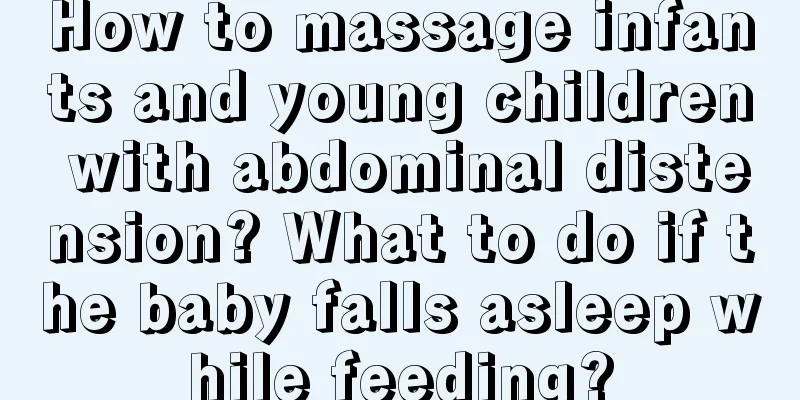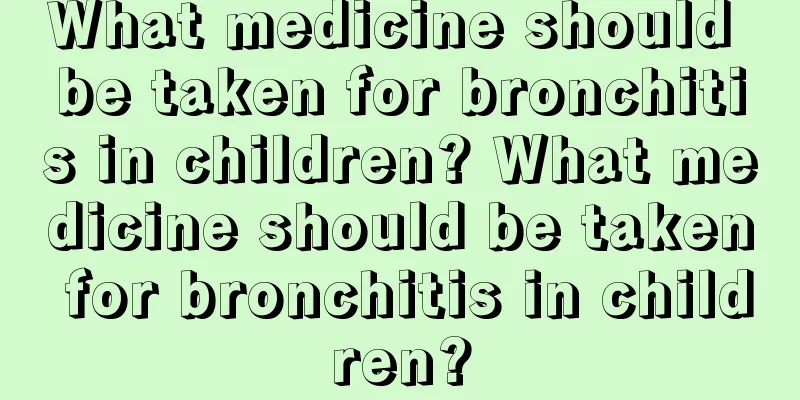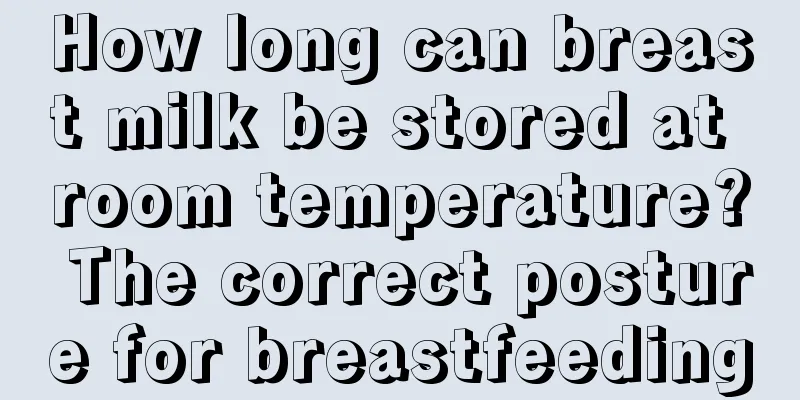Baby vaccination process Can infant vaccines be postponed?
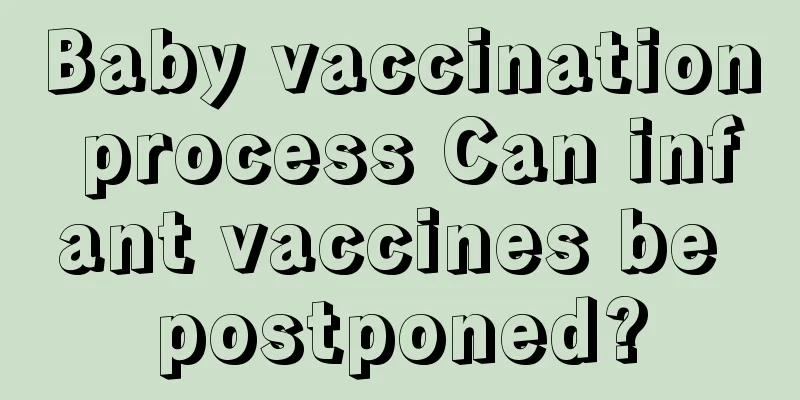
|
In order to enhance the baby's immunity, parents pay attention to the vaccination time of various vaccines from the birth of the baby, for fear of missing the baby's age. Are mothers clear about the baby's vaccination process? Baby vaccination processBabies will start receiving various vaccinations after birth, and will need to be vaccinated regularly as they grow older. The following are the types of vaccinations and their schedules: Type I immunization: 1. BCG is injected once when the child is born. 2. The polio vaccine is given three times in total. The first dose is given when the child is 2 months old, and the next dose is given at 3 and 4 months. 3. The pertussis, diphtheria and tetanus combined vaccine is given three times in total, the first time when the child is 3 months old, and then once at 4 and 5 months. 4. The first measles vaccine is given when the child is 8 months old, and then it is repeated at 1 year old, and boosted once at 6-7 years old, 12-13 years old, and 18-19 years old. 5. The hepatitis B vaccine is given three times, once at birth, once at 1 month, and once at 6 months. 6. Both meningococcal vaccine and Japanese encephalitis vaccine are administered to children when they are 6 months old and boosted at 1 year old. 2. Category II selective vaccines Epidemic meningitis vaccine: 1 injection at 3 years old, with booster shots at 6 and 9 years old. Acellular DTP: It can replace the whole-cell DTP vaccine. The vaccination procedure is the same as the whole-cell DTP vaccine. Mumps-rubella: One injection at 1.5-2 years old, and a booster injection 4 years after the basic immunization. Live attenuated hepatitis A vaccine: The live attenuated hepatitis A vaccine is administered once at the age of 2 years, and a booster shot is given 4 years later. Inactivated Hepatitis A vaccine: 2 doses at 6 months intervals for children aged 1-16 years, and 1 dose for children aged 16 years and above. Hepatitis A and B: Children aged 16 and above Varicella: 1 dose for children aged 1-12 years. Flu: 2 shots per year for children aged 1-3, with a one-month interval. Once a year for children aged 3 and above. HIB: To prevent pneumonia and meningitis, imported vaccines require four shots, and the reaction is relatively small. One shot each at 2, 4, and 6 months old, and one shot is enough for children over 12 months old. It is best to get the shot at the 15th month, and one shot is enough. Rotavirus: Infants and children aged 2 months to 3 years. It is best to vaccinate them after 6 months of age, in the autumn when the disease is most prevalent. Pneumonia: 3 doses for children aged 7-11 months, 2 doses for children aged 12-23 months, and 1 dose for children aged 24 months to 5 years. Can infant vaccinations be delayed?1. Each vaccine has a fixed age limit for injection. Some vaccines must be injected at birth, while some vaccines require parents to take the child back to the hospital for a one-time injection when the child is one month old. These two vaccines are hepatitis B and BCG. Except for hepatitis B and BCG, there are actually no very strict restrictions on the exact age for injection of vaccines. 2. Although the hospital has also proposed the age that is more suitable for injecting Class I or Class II vaccines, if the child is feeling unwell at the time, or happens to be in a period of fever or extremely bad emotional and physical condition, the vaccination can be postponed, and it will not affect the absorption efficiency of the vaccine. If the child is unwell and is forced to be vaccinated, this will cause adverse reactions and even cause convulsions in the child. 3. If it is not due to the child's physical condition, it is recommended that you do not postpone the vaccination, because the main purpose of vaccination is to prevent infectious diseases and make the child's body healthier. If the child is not able to be vaccinated on time due to the parents' own psychological reasons, the child may be exposed to the risk of infection. Baby vaccination costsThe cost of baby vaccines generally refers to the cost of parents paying for the second-class vaccines for their babies. What are the second-class vaccines? Here, we must first know the classification of vaccines that babies need to be vaccinated. The first-class vaccines refer to the vaccines that citizens should receive in accordance with government regulations. These vaccines are provided to citizens free of charge by the government, that is, they are free; and the second-class vaccines refer to the vaccines that citizens pay for and voluntarily receive. This type of vaccine is voluntary and self-funded. Everyone can choose according to the family situation. The cost of family vaccination for babies is mainly spent on the second-class vaccines. The cost of the second-class vaccine generally refers to the following: service fee of 1 yuan per person, 0.7 yuan per person per time using ordinary disposable syringes, and 0.8 yuan per person per time using self-destructive syringes. The fee is charged by the vaccination unit, that is, the hospital or clinic where the vaccination is given. However, the price of vaccines varies, and the price of vaccines produced by different manufacturers varies. Therefore, the specific cost of the second-class vaccine is also different. You need to go to the vaccination unit to inquire for details. The role of vaccinations in infants and young children1. Reduce mother-to-child transmission rate Vaccines can stimulate the human body to produce corresponding immune capabilities, prevent such diseases from causing the body to have an excessive immune response, and thus protect other parts of the body from harm. For example, after receiving the hepatitis B vaccine, the possibility of mother-to-child transmission can be effectively reduced, which also reduces the chance of the baby being infected with hepatitis B by the mother. 2. Prevent infectious diseases As children grow older, they will be vaccinated with polio, DPT, measles, Japanese encephalitis, meningitis, and mumps-rubella vaccines. In addition, vaccines for varicella and influenza type B can be selected according to the child's immune capacity. It should be noted that after entering kindergarten, the baby has more opportunities to contact the outside world, which greatly increases the chance of illness. Therefore, it is best to vaccinate the baby against highly infectious diseases such as varicella and hepatitis A before entering kindergarten. TIP: Vaccines actually simulate pathogen invasion, so if the vaccine is not destructive, it will not be able to get the attention of the body's immune function and will not play the role of inducing the body's immune response. Therefore, the most effective is the live attenuated vaccine, followed by the inactivated vaccine, and the component vaccine is the worst. The corresponding live attenuated vaccine is the most dangerous, while the component vaccine is the safest. |
<<: Is it good for babies to drink soup? At what age can babies drink soup?
Recommend
When is the best time to get an IUD? What are the disadvantages of getting an IUD?
IUD is a contraceptive measure chosen by most wom...
What to do if a newborn baby hiccups? What to do if a newborn baby hiccups
Newborn infants have weak digestive tract functio...
What is the best day to give birth in June 2017? What is the best day to give birth in June 2017?
A newborn is the hope of a family. All parents ho...
What should I do if my child sees me having sex?
Parents with children are likely to be caught by ...
What should I do if the due date has not come yet? What should women pay attention to during pregnancy?
Many women are pregnant for about ten months. Aft...
Can I use a fan during confinement in summer? Can fans be used by mothers in summer?
The most important issue for mothers who are conf...
How can pregnant women prevent hemorrhoids after childbirth? Why are women more likely to suffer from hemorrhoids after childbirth?
Postpartum hemorrhoids are a very common disease....
Is wild wolfberry poisonous? Can pregnant women eat wild wolfberry?
Wolfberry is a good food supplement. It can be us...
Is it normal for pregnant women to have milk? When does a pregnant woman have milk?
Women will have milk after they become pregnant. ...
Are electronic mosquito repellents really useful? How do electronic mosquito repellents work?
Electronic mosquito repellent is a very common pr...
How does baby dandruff occur? How to remove baby dandruff?
We often see that newborn babies have a lot of da...
Can I eat crabs during breastfeeding? Does eating crabs during breastfeeding have any effect on the baby?
Breastfeeding is a special period for mothers, es...
How long can the umbilical patch be applied? Can the umbilical patch treat umbilical hernia?
Umbilical patch is a baby product. At the same ti...
What is the best way to spend the confinement period after having a second child? What should I do after having a second child?
From ancient times to now, confinement is a very ...
What to do if children have repeated fever due to acute gastroenteritis? Do children with acute gastroenteritis need infusion?
Acute gastroenteritis not only occurs in adults, ...
